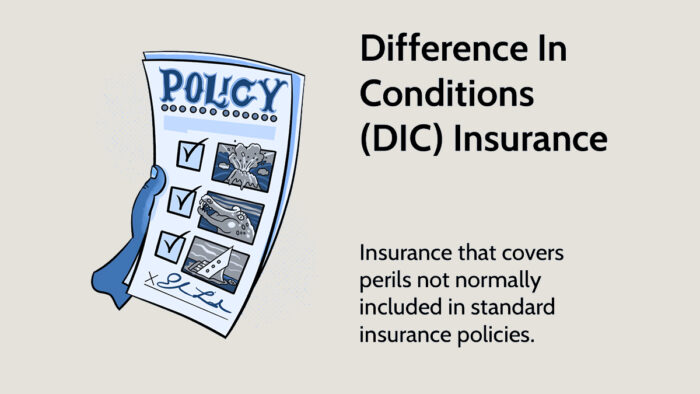Difference in conditions insurance is an insurance policy that is designed to provide coverage for risks not typically covered by standard property insurance policies. It basically fills in gaps in coverage.

For business proprietors, particularly those overseeing sizable enterprises with valuable corporate structures, DIC insurance serves to supplement standard business insurance by addressing potential financial losses post-disaster.
Conversely, the necessity for a DIC policy is less common among average homeowners, as standard homeowners’ insurance typically provides sufficient coverage for most common risks, rendering additional DIC insurance unnecessary for perils already addressed by standard policies or optional endorsements.
How Does a Difference in Conditions Insurance Work?
Difference in Conditions (DIC) insurance serves as a supplementary coverage option that complements standard insurance policies by addressing potential gaps in coverage.
This specialized insurance is particularly valuable for protecting against catastrophic events like earthquakes, floods, and other significant disasters that are typically excluded from conventional policies. While it is possible to enhance standard policies with additional endorsements, they may still leave certain risks unaddressed.
For enterprises with extensive operations, commercial real estate holdings, or global ventures, a DIC policy can offer valuable protection through surplus line carriers. These carriers specialize in underwriting non-traditional risks and financial exposures that conventional insurers may avoid. Unlike standard commercial or homeowners policies, DIC policies are individually crafted to align precisely with the policyholder’s specific requirements.
Furthermore, surplus insurers often operate without the need to file rates or policy terms with state authorities, granting them flexibility in their coverage offerings. Given the substantial value associated with DIC policies, it is common to encounter elevated premiums and deductibles.
To determine the suitability of a DIC policy for residential or commercial properties, consulting with an insurance agent or broker is advisable. Their expertise can help navigate the intricate language of DIC insurance and explore tailored coverage options. Alternatively, individuals can reach out to the Insurance Marketplace for information on surplus line providers within their state.
What Does DIC Insurance Cover?
A policy for difference in conditions (DIC) may be vital for various reasons, but it is often acquired to secure financial protection against uncommon disasters. Although standard home and commercial insurance policies cover some damage from extreme weather events like fire, windstorms, hail, and snow, there are certain catastrophes that these policies typically exclude.
Typical insurance exclusions encompass, but are not limited to floods, earthquakes, landslides, and mudflows. If you reside in a region susceptible to these excluded losses and can buy additional endorsements or separate coverage, such as a flood policy or earthquake endorsement, it is advisable to consult your agent about modifying your existing policy.
A DIC typically won’t provide coverage for losses the primary insurance policy aleady covers. Nonetheless, if the insured property requires coverage beyond what the underlying policy offers, a DIC policy can step in to provide that extra coverage.
Also, difference in condition (DIC) policy can offer extensive coverage for floods, landslides, mudflows, and earthquakes, which typically bear separate flood tide and earthquake policies.
DIC Policy for Homeowners
Just like HO-3 or HO-5 policies, DIC insurance can offer coverage on a named peril basis or as an all-risk policy. Homeowners frequently seek content for at least one of the following threats:
- Earthquake
- Flood
- Landslide
- Mudflow
- Wildfire
- Absence of coverage from a FAIR Plan policy
DIC Policy for Commercial Properties
Commercial properties can experience the same weather-related perils as homes but have a significantly higher replacement cost and unique additional risks requiring coverage. DIC policies may cover losses from:
- Fire, earthquake, flood, landslide, mudflow
- Business interruption
- Increased liability risk
- Any unique peril authorized by the surplus insurer
Who Benefits from a Difference in Conditions Insurance?
- Homeowners in High-Risk Areas: Individuals residing in regions prone to natural disasters or rare, catastrophic damage may find a DIC policy beneficial if standard coverage is unavailable.
- Homeowners Facing Coverage Denials: Homeowners denied standard policy coverage due to factors like location, age, or construction type can explore DIC insurance as an alternative.
- Recipients of FAIR Plans: Property owners resorting to Fair Access to Insurance Requirements (FAIR) plans, which lack coverage for certain perils, can enhance their protection by adding a DIC policy.
- Luxury Homeowners: Owners of luxury homes, where traditional policies may not offer sufficient coverage limits in case of a total loss, can benefit from the tailored coverage options of a DIC policy.
- Business Owners: Particularly large-scale business owners who require expanded coverage options beyond standard commercial policies can leverage DIC insurance to enhance their risk management strategies.
- Commercial Property Owners: DIC policies are commonly utilized by business properties to supplement coverage provided by basic commercial policies, offering additional protection for various risks and scenarios.
- Construction Companies: Entities in the construction industry often rely on DIC policies to extend coverage from underlying builder’s risk policies, ensuring comprehensive protection during project execution.
These are the individuals and businesses that stand to benefit significantly from Difference in Conditions (DIC) insurance, leveraging its tailored coverage options to safeguard against specific risks and enhance their overall protection strategies.
FAQs
What is Difference in Conditions (DIC) Insurance?
DIC insurance is a specialized policy that supplements existing insurance coverage by filling gaps left by standard policies. It provides enhanced protection against catastrophic perils like floods, earthquakes, theft, and liability, which traditional insurance plans may not cover.
Who needs a DIC policy?
While the average homeowner may not require a DIC policy, business owners with large companies and expensive corporate buildings often benefit from this type of insurance. DIC policies bridge the gap between standard business insurance coverage and potential financial losses, making them essential for businesses facing significant risks beyond what traditional policies cover.
What insurers offer DIC policies that complement FAIR Plan coverage?
Insurers like California Automobile Insurance Company, California Mutual Insurance Company, and CSAA Insurance Exchange provide DIC products that enhance coverage when combined with a FAIR Plan policy.
What types of businesses or property owners benefit most from DIC insurance?
Businesses with unique risks, high-value properties, or those located in high-risk areas like California can benefit significantly from DIC insurance, which provides enhanced coverage for catastrophic perils not typically covered by standard policies.



